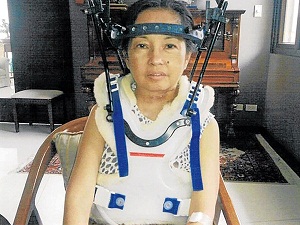The "Lawyered!" series will cover topics involving the law, law school and everything in between told from the perspective of a frightened, enlightened, irritated, and engaged law student. :)
Fresh from my US case law-inspired Constitutional Law 2 class, from which I didn't finish on top of (yes, this gives you the right/basis to question/doubt my opinion), I re-visit my much-neglected blog series,
Lawyered.
First, dear reader, I apologize for the one year hiatus of this blog series. Law school proved to be much more time-consuming and holistically demanding than I predicted it to be. In my first year, I incurred grades I have never gotten in my entire academic life and I had to focus on studying rather than
blogging about studying. Anyway, this series is back...for now.
The topic:
DOJ's ban on former Pres. GMA's travel abroad to seek medical attention
The simple, condensed facts:
PGMA asked for a travel authority from the House of Representatives (note: as a Congresswoman, she needs to seek the approval of the House and the Speaker when leaving the country) due to health reasons, particularly to seek medical attention (biopsy) for her cervical spine infection. The House allowed her to leave but the DOJ, headed by Sec. Leila De Lima, has denied her request to be removed from the Watch List Order issued by the Secretary pursuant to Department Order No. 41. Now, PGMA seeks to nullify
Department Order No. 41 which was issued on 7 June 2010--during her administration. Mainly, PGMA is arguing that the said Department Order curtails her constitutional right to travel based on Article III, Section 6 of the 1987 Constitution.
 |
| Photo from ellentordesillas.com |
I have finished Constitutional Law 1 and 2. These subjects were taught in contrasting manners by different professors, who I shall not name, but whose techniques in teaching I will
try to use here. Let's call these contrasting approaches as the Consti 1 - Legal approach and the Consti 2 - Political approach.
The Consti 1 - Legal Approach
Issue: W/N the DOJ's ban on former Pres. GMA's travel abroad to seek medical attention for her cervical spine condition is valid, considering the preliminary investigation on the electoral sabotage case against her and FG Mike Arroyo has started?
Answer: Yes because it is legally grounded on Department Order No. 18 issued on 23 April 2007 granting the DOJ Secretary the power to issue Watch List Orders prohibiting persons who have a preliminary investigation being done
involving them
or in cases when a Motion for Reconsideration is pending review before the DOJ including application for "Not The Same Person" (NTSP).
The Consti 2-Political Approach
Issue: W/N PGMA's constitutional right to travel (for "pressing" medical reasons) can be curtailed by the State's interest in national security or in protecting our justice system?
Answer: No because the constitutional right to travel is one of the fundamental rights granted by the Constitution, as evidenced by it being included in the Bill of Rights. As such, it must be protected with great scrutiny, and controversies must be settled in favor of upholding the said right. In this case, what is being balanced is a citizen's right to travel (and to obtain competent medical attention for her 'pressing' medical condition) and the State's interest in protecting our justice system.
The question is,
Is the State's interest in protecting the integrity of our justice system far greater than an individual's right? No. There are other ways in which the integrity of the justice system can be protected and maintained
without stepping on PGMA's right. It is wrong, at least for me, to say that:
the greater good shall prevail over the interest of the few.
Constitutional rights have never been, in the few cases I've read and we've discussed in class,
about "majority wins". It's about protecting the interest of the minority, of the individual. This is democracy in its most fundamental level.
To help you understand this, and just to keep the
How I Met Your Mother parallelism going, let me illustrate the importance democracy gives to individual liberty by using a scene from
The Rough Patch (Episode 7 Season 5). Marshall and Ted are trying to convince Lily to break Robin and Barney up because their relationship is killing them.
Marshall: You've got to break them up. This relationship is killing them.
Lily: I know it is but I've learned my lesson: no more interfering; let things run their course.
Ted: It's two to one.
Lily: Yes, but the one is me.
Imagine that everyone else is Marshall and Ted, the majority, and PGMA is Lily--the individual, the minority. Even if Lily's alone she
matters.
I believe, no matter how crappy PGMA is as a person, she still has the right to travel whenever she pleases especially in cases when her health so demands. If she chooses to obtain medical attention abroad, no one can/should be allowed to stop her. The decision on who and how one's medical complications will be treated should be decided by the person who needs it. Having the freedom to make a choice is very fundamental, and it lies at the core of each and every constitutional right granted to each citizen of the Philippines.
The ultimate choice of which approach will apply in this case is, again, at the hands of fifteen Supreme Court Justices--twelve of which was appointed by the petitioner. I disagree with what some are saying (that this is simply a legal issue) because
choosing which approach to apply, whether the legal or political approach, is
political in itself.
Lawyered!
-------------------------
You may want to check:
Lawyered: The Law-down
Lawyered: Do the Math
Lawyered: Top Reasons Why You Should Date a Law Student











































